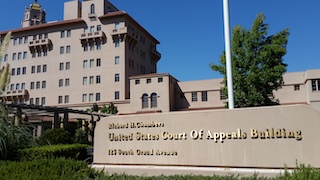Federal law, at 18 U.S.C. § 3582(c)(1)(A), provides for a United States District Court to order the compassionate release of an inmate in federal custody. This is motion, also known as a motion for reduction of a sentence, is not an easy thing to win, as the judge will first need to see that the petitioning prisoner has exhausted his statutorily prescribed administrative remedies with the Bureau of Prisons (“BOP”), as the following summary of the reported Ninth Circuit decision involving Daniel Eugene Keller epitomizes.
In 2015, Keller pled guilty to possession with intent to distribute at least 50 grams of methamphetamine and to being a felon in possession of a firearm in violation of 21 U.S.C. § 841(a)(1), (b)(1)(B, and 18 U.S.C. § 922(g)(1), respectively.
The district court sentenced him to 173 months in federal prison, followed by eight years of supervised release. Subsequently, on the government’s motion, his prison sentence was reduced to 137 months.
When COVID-19 saturated the country’s prisons and jails, Keller filed a motion for compassionate release under § 3582(c)(1)(A). The government concluded that Keller had exhausted his administrative remedies with the BOP under 18 U.S.C. § 3582(c)(1)(A) and addressed Keller’s motion on its merits. However, the district court denied the motion in a one-page order on September 4, 2020, concluding that the sentencing factors under 18 U.S.C. § 3553(a) “weighed against compassionate release.”
Keller then appealed to the U.S. Ninth Circuit Court of Appeals in Pasadena.
 U.S. Ninth Circuit Court of Appeals Pasadena
U.S. Ninth Circuit Court of Appeals Pasadena
However, while his appeal was pending, Keller filed a second administrative request for a sentence reduction with the warden of the facility. Keller did not wait for a response. Instead, just eight days after filing the second sentence reduction request, Keller filed a “Renewed Motion for Compassionate Release” (most likely with responses to the district court’s finding that the sentencing factors did not support his release) with the district court.
In response to the “Renewed Motion for Compassionate Release,” the government objected to Keller’s motion, arguing that he had not first exhausted his administrative remedies with the BOP prior to seeking relief with the district court.
Meanwhile, on January 19, 2021, the warden denied Keller’s second administrative request for a sentence reduction.
Without addressing the government’s objection to the “Renewed Motion for Compassionate Release,” the district court denied the renewed motion on February 12, 2021. Keller filed another appeal to the U.S. Ninth Circuit Court of Appeals in Pasadena.
The Ninth Circuit then consolidated both pending appeals and allowed supplemental briefing.
The Ninth Circuit first evaluated whether Keller’s failure to exhaust his administrative remedies on the renewed motion for compassionate release could be excused. The appeals court surveyed many other cases addressing this and concluded the answer was no.
Turning then to Keller’s appeal of the September order, wherein Keller had first exhausted his administrative remedies before filing his motion, the Ninth Circuit reevaluated whether the district court abused its discretion or if it rested its decision on clearly erroneous findings of a material fact. United States v. Aruda (9th Cir., 2021) 993 F.3d 797, 799 (abuse of discretion is the standard by which sentence reduction decisions are reviewed).
The Ninth Circuit then got to the merits of the sentence reduction requested by Keller and reviewed whether “extraordinary and compelling reasons warrant such a reduction” and “the factors set forth in 3553(a) to the extent they are applicable.”
Specifically, when determining, under the sentencing factors listed under 18 U.S.C. § 3553(a), whether Keller “remained a danger to the safety of any other person or to the community,” the district court had explained that Keller committed “multiple federal crimes” that involved “drug trafficking and firearms” and rejected Keller’s argument that his physical ailments would prevent him from committing such crimes because they “did not require a great deal of mobility.” The district court further noted that Keller had 55 months remaining of his 137-month sentence.
Given Keller’s extensive criminal history, the Ninth Circuit found that the district court did not abuse its discretion in denying the request for a sentence modification for compassionate release.
Keller had argued that the district court abused its discretion by not performing a detailed, step-by-step analysis of each sentencing factor. The Ninth Circuit responded to this argument, explaining that a detailed, step-by-step analysis was required by the court if it grants the motion, but no such step-by-step analysis is required in denying such a motion.
We bring this short summary to the reader’s attention because compassionate release from federal custody is a common inquiry we receive from friends and family of those in federal custody.
The citation for the U.S. Court of Appeals for the Ninth Circuit ruling discussed above is United States v. Daniel Eugene Keller (9th Cir., 2021) 2 F. 4th 1278.
For more information about compassionate release and elderly parole, please click on the following articles:
 U.S. Ninth Circuit Court of Appeals Pasadena
U.S. Ninth Circuit Court of Appeals Pasadena